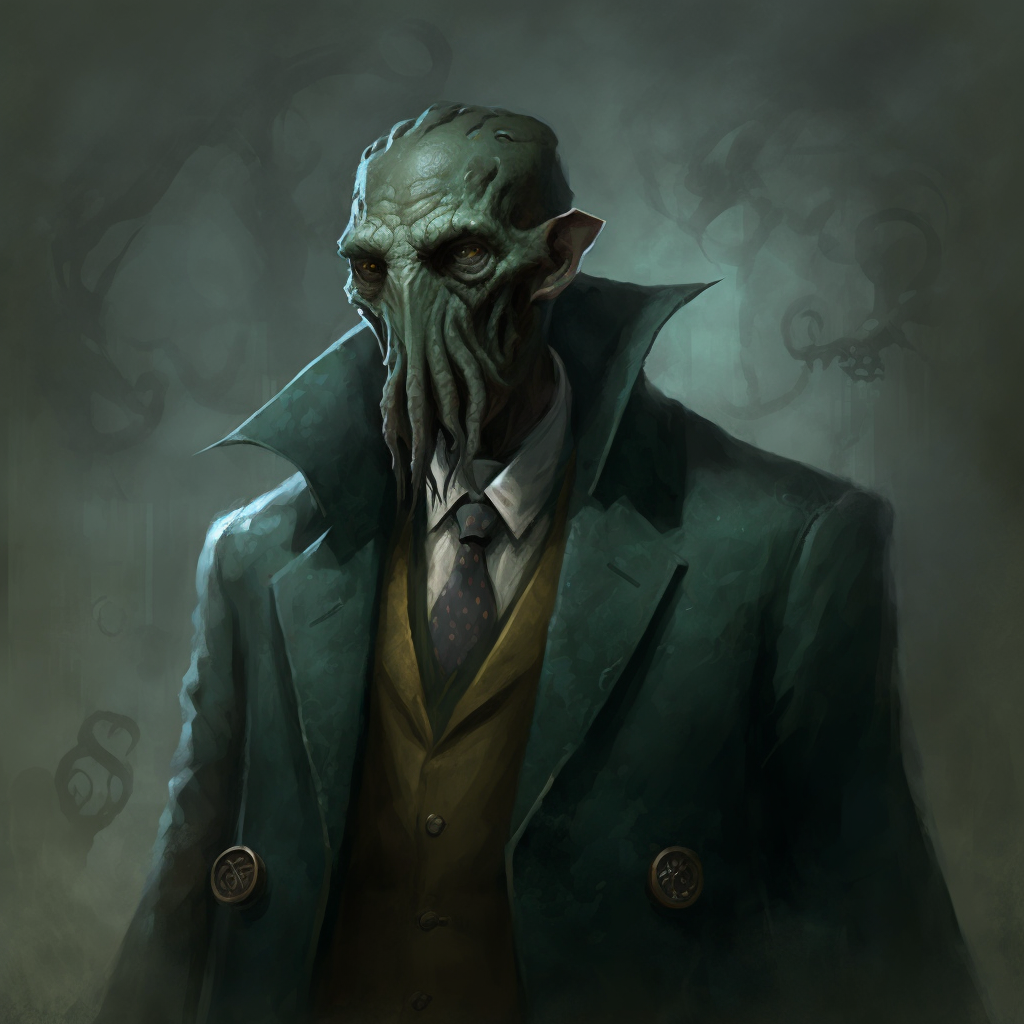Jump to section

Nik
Mar 29, 2023 · 13 min read
Call of Cthulhu Character Creation
characters
character creation
call of cthulhu

Creating an Investigator for Call of Cthulhu 7th edition
Call of Cthulhu is a horror tabletop role-playing game (TTRPG) inspired by H.P. Lovecraft’s cosmic horror universe. You play as a regular person drawn into a sprawling investigation (either through unlucky circumstances or grim curiosity) until you eventually uncover truths no human should ever confront.
Does that sound ominous? Don’t worry, it gets worse. As the game's mysteries unfold, your character will come face to face with the Cthulhu Mythos. The Mythos is a collection of cosmic horrors lurking within the deep shadows of the universe around you. You know, that eerie feeling of being watched as you walk down a dark alley, that horrible drop in your stomach as you enter a dark room, that surprise realisation you are actively in a cult? THAT is the Cthulhu Mythos staring you straight in the face. Because behind every uneasy feeling within Call of Cthulhu lurks the dark deities and sinister gods of Lovecraftian lore, like the Outer Gods, Elder Gods, and the Great Old Ones.
If you’re looking for a game filled with eerie mystery, then delve into this guide to creating your investigator as you explore the unknown.
Call of Cthulhu Eras
The most common era to play is in the 1920s, but many eras are supported, from the Roman Empire to the Dark Ages, the Wild West to 1890s Victorian London, right the way through to the modern day and beyond.
The 1920s were the birth of the modern era, often referred to as the jazz age or the roaring twenties. It saw an explosion of everything from technology to architecture. This era has lots to explore, from prohibition to the great depression, from literary greats like The Great Gatsby to the infamous Al Capone. The gritty noir setting provides the ideal era for your first foray into the darker version of our world in Call of Cthulhu, known as the “Classic era.”
Creating a character
Now that you have a brief primer, let's create an Investigator.
Unlike class-based systems that force you to specialise in one direction, Call of Cthulhu is a skills-based system. This means you are free to build your character exactly as you want. If you want an Archeologist who is also a fencer you can, or if you would like a Soldier who is an expert in history, you can. There are no limitations on your character, only the points you can spend.
To start, let's make an investigator using Chaosium's free Quick Start Rules for Call of Cthulhu 7th edition. This 46-page booklet has everything you need to make your first investigator, plus a classic adventure titled The Haunting.
Call of Cthulhu character sheets
There are many options for creating your character sheet. Some prefer physical sheets found in the back of the Quick Start Rules, while others prefer to download a PDF auto-calc sheet from Chaosium. Dhole’s house also provides a digital solution to make your character that removes any worries about how many points you have to spend or what you can spend them on. For a full campaign experience, check out Quest Portal’s Call of Cthulhu character sheet. It includes a robust note section perfect for detailing your investigator's darkest secrets.
Picking a character name
There is no one true way to go about your character conception, but I like to start with a name. There is a perfect resource if you can’t come up with one off the top of your head. Fantasy name generator. Simply pick your ancestral background and click generate until you find a name you like.
Pop that on the top of our character sheet. You now have a name. Your character is one step closer to the darkness.
Write a backstory
Call of Cthulhu has provided headers in the character sheet to put your backstory elements into, like your personal description, significant people, and your meaningful locations.
A good backstory helps you develop who your character is. What are their motivations, who are their loved ones, and what do they care about? All these and more can be written now or developed through play. Something that is a vague idea in a bullet point can become a main focal point for your character in the future.
Different players approach this differently. Some give their GM, or “Keeper of Arcane Lore” in Call of Cthulhu, a page with ten bullet points, and some give them a novella. Keep in mind that your GM needs to easily navigate your backstory to incorporate its elements into the campaign. Feel free to toss in extra secrets about your character to give your GM hooks to bring into the session. Nothing beats the stunned silence from the group when a secret is revealed.
Choose an occupation
Call of Cthulhu uses occupations similarly that other systems use classes. There are many to choose from, with some restricted to the era you are playing in. After all, there is no point in having a gunslinger in 1920s Arkham (Yes, Arkham existed well before Batman).
The Quick Start Rules contain a selection of typical Lovecraftian occupations, but you are not limited to these. Often your investigations will examine historical sites, so Historians and Archaeologists could be a safe option. But if you are looking for a more unusual option for interesting role-playing, a bootlegger or jazz musician could also be fun.
Sometimes your GM will have a particular setting for your scenario, so it is always worth checking with them that your occupation will fit. As we are going to build a character using the Quick Start Rules, we will choose one of the sample occupations and add that to the character sheet.
Art (Literature), History, Library Use, Natural World or Occult, Other Language, Own Language, Psychology, any one other skill
Private Investgator
Art/Craft (Photography), Disguise, Law, Library Use, one interpersonal skill (Charm, Fast Talk, Intimidate, or Persuade), Psychology, Spot Hidden, and any one other skill (e.g. Locksmith, Firearms)
Summon your character to existence with Quest Portal’s avatar portrait generator
Having an image of your character brings them to life and allows the rest of your party to identify with your character. A simple and fun way to do this is by using the Quest Portal avatar portrait generator. The built-in avatar generator can create a portrait from a brief prompt, or you can choose from a vast library of portraits divided into genre and era-specific categories.
From a simple description, you can create original images. Try your investigator's occupations, then add extra prompts like their age, hair, or even a scar. The prompts can be as short or as long as you like, have fun with them and find that perfect portrait for your character. You will be given the choice of five generated images, and you can keep adjusting your prompt until you find one that fits.
Roll for characteristics
With everything so far, we have mainly concentrated on the conception of the character and who they are. Now it’s time to transfer that concept into numbers.
Call of Cthulhu uses eight characteristics that define your character's physical and mental aspects. The typical stats you would find in most tabletop games are strength, dexterity, constitution, and intelligence. But Call of Cthulhu goes one step further with stats such as power, appearance, size, and education.
- Strength (STR) - Roll (3d6) x 5
- Constitution (CON) - Roll (3d6) x 5
- Dexterity (DEX) - Roll (3d6) x 5
- Appearance (APP) - Roll (3d6) x 5
- Power (POW) - Roll (3d6) x 5
- Size (SIZ) - Roll (2d6+6) x 5
- Intelligence (INT) - Roll (2d6+6) x 5
- Education (EDU) - Roll (2d6+6) x 5
These eight characteristics are then used to create secondary attributes, like hit points, damage bonuses, build, and even sanity.
…wait, did you say sanity?
Oh yes, sanity! At the beginning of the scenario, your character is blissfully unaware that anything outside of the mundane exists. Unfortunately for them, they will see things that no human was ever meant to see, which will take a mental toll on them. This is represented with sanity. Sanity can be affected by anything from reading something unsettling to coming face to face with the great and terrible Cthulhu. The power stat in characteristics represents what your starting sanity will be.
Choosing skills
Now that you have your characteristics, we can move on to skills. These can differ between different occupations. But let’s keep this simple and use the Quick Start Rules as a guide.
Your points are divided into two sections: occupation and personal interest skills. Occupational skills can only be spent on the skills directly connected to your chosen occupation. But you can spend the personal interest points on anything you like, including adding to your occupational skills. But sticking to the Quick Start Rules, we will pick four non-occupation skills. These can be anything from you being a budding artist to a keen amateur historian, so look upon these as a way to add some personality to your character.
Anthropology
Can identify and understand an individual’s (or culture’s) way of life through observation.
History
Recall a historical detail or event, the significance of a country, city, region, or person, as pertinent.
A quick note on credit rating
The credit rating skill indicates your wealth and class in the game. So if you want to play a rich philanthropist, remember you have to spend those points to gain wealth. That being said, Call of Cthulhu doesn’t track every bit of money spent. Instead, it uses a system for daily spending, cash, and assets.
Equip your investigator
Unlike some systems, Call of Cthulhu doesn’t require you to note down every single item you own, and very rarely will you have to worry about encumbrance. Instead, note down your essential or notable items. For example, a doctor would have a doctor's bag, just as a journalist would have a notepad or maybe even a camera.
When it comes to weapons, this is where it gets dangerous. Very rarely will investigators be experts at using weapons, so there is always the chance that when you pull out that shotgun that things could go very badly for you or your fellow investigators.
Let’s paint a grim picture, shall we? A shotgun at close range does 4D6 damage, which means it could potentially deal 24 points of damage in a single shot. However, the average investigator has 10 hit points. On a critical fail, you could swiftly find yourself with one less party member…
To sum up
Ready to descend into the mysteries of the mythos lurking within Call of Cthulhu? Check out your local game store or one of the many vibrant gaming communities online for folks running campaigns. Call of Cthulhu is uniquely perfect for virtual tabletops (VTTs) due to its emphasis on roleplay and immersion. Quest Portal is my favourite (and I have tried most of them). This VTT has official support for Call of Cthulhu and includes your character sheets, music, pre-made scenes for your adventure, and an excellent onboard voice chat that will please any audiophile. It receives constant updates, and even though it is still in early access, it works very well and even has a mobile app). You can pick up the free adventure titled Lighless Beacon, which comes with characters, scenes, and everything else you need to start playing Call of Cthulhu.
Check out the Quest Portal discord. There are games posted in the “Looking for players” section to start you on your adventure and discover the mythos yourself, as well as a community of passionate gamers of many systems.
I wish you the best of luck (you will need it!) and a wonderfully horrifying time, whichever side of the table you sit on.